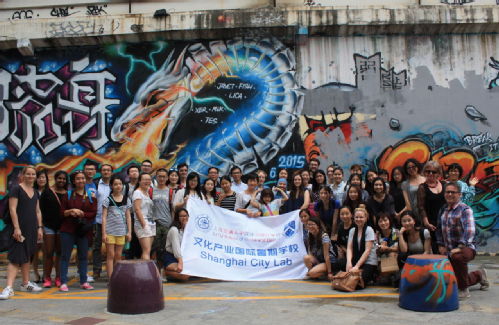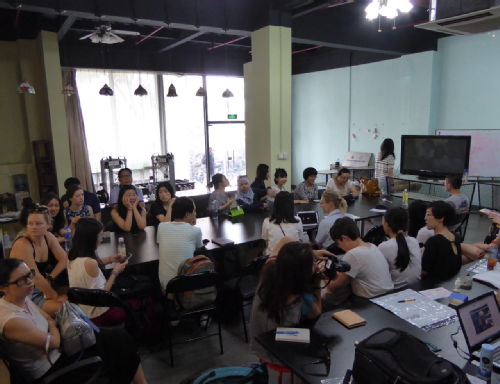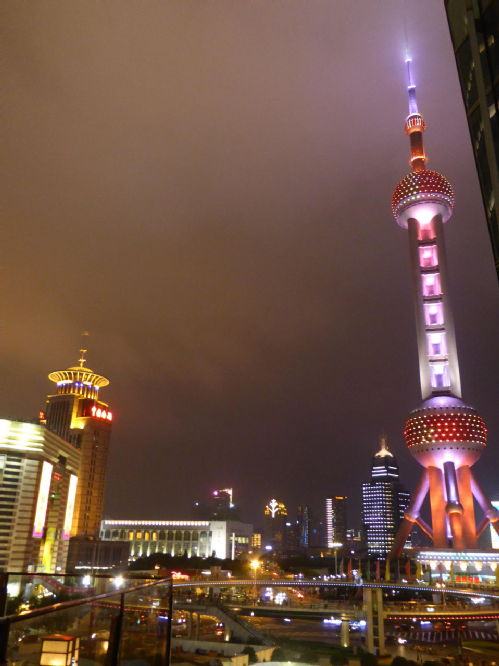Shanghai City Lab Second Cultural Economy Summer School
The Second Shanghai City Lab (SCL) Cultural Economy International Summer School was held at the School of Media and Design, Shanghai Jaio Tong University, between 3rd and 17th of July 2015. It was a full two weeks (13 days) full time with lectures, visiting talks, case studies, field trips and social events. This year 55 students attended; many of these were masters students but there were also PhD and even young faculty scholars. Students had come as far as Stanford and Oxford. Altogether, the 2015 summer school featured 16 formal lectures by nine faculty members, visits to 13 different Shanghai cultural sites, six visiting professionals talking about their industries in the city, three days of group work (supervised urban research in Shanghai), and a final presentation day. The photo below was take on a site visit to the creative cluster M50 -- it doesn't include everyone.

This year’s theme was “Work in the Cultural Economy”. We began with the questions -- What is it to work in the cultural economy? What kind of labour is involved, and what kind of skills are required? What kind of career strategies are needed? This was framed by Bourdieu's theory of the field of cultural production and the 'trajectory' cultural producers within it. These questions continued throughout the various lectures, discussions and site visits. And mostly because we had some great visiting professionals, as well as visiting scholars, students were able to find out what working in the creative field like in Shanghai.
Lectures included:
Justin O’Connor (Monash University) on cultural economy, cultural field and cultural work.
Jonathan Vickery (Univeristy of Warwick) on cultural policy, cultural economy and cities.
Gu Xin (Monash University) on the field of Chinese contemporary art, creative city and creative clusters.
Scott Brook (University of Canberra) on Bourdieu, applied field theory, the literary field and cultural work in Australia.
Jen Webb (University of Canberra) on graduate careers and creativity.
Shan Shilian (Shanghai Jiao Tong University) on China’s cultural policy.
Li Kanghua (Shanghai Jiao Tong University) on Shanghai’s cultural economy and policy contexts.
Deng Lin (Shanghai Jiao Tong University) on cultural economy field research.

[This picture above was our seminar in a Maker space in Shanghai]. Our visiting professionals included Professor Wang Hong Tu of China’s first MFA program at Fudan University – talking about Shanghai’s literary field and the life young creatives can expect. Lisa Movias, now head of the China bureau of the Art Newspaper, talked to us about Shanghai’s emerging cultural milieu and the new venues in the city. Social theatre pioneer, Zhao Chuan, told us about experimental Chinese contemporary art in Shanghai and particularly his Grassroot Stage organization. Advertising guru Peter Soh gave us an insight into the communications media industries in the city, and Linda Lin similarly opened up the animation industry, with particular reference to its global influences.

Our site visits this year – both tutor-led visits, with talks, and the students own group research – included the Rockbund Art Museum; The Shanghai Bund; the Old Town; the old EXPO 2010 site – particularly the China Art Museum and the Power Station of Art.
We paid particular attention to two urban phenomenon – first, the new West Bund Cultural Corridor (including the Long Museum, Yuz Museum, K11 art space, Photography Museum, and the public art and design of this expanse of land); and second, the Creative Clusters, particularly Creative Warehouse, Tianzifang, South Suzhou River, M50. We also had a day discussing Maker and Hacker culture, with site visits to pioneer David Li’s space in south Shanghai, and new enterprise DF Robot, and their community space at the giant technology enterprise park in Pudong.
The two weeks ended with two days of student group research in the city, where each student chose a site and topic for investigation. Research methods could be experimental – using film and photography – or standard methods, like interviews, observation, compiling data. On the last day – the Friday – we heard all eight presentations, after which feedback was given, and then finally, all students received a signed and stamped certificate for successfully completing the Summer School.
For more pictures, see my Flickr site:
https://www.flickr.com/groups/2830292@N25/pool/
 Jonathan Vickery
Jonathan Vickery


 Loading…
Loading…
Add a comment
You are not allowed to comment on this entry as it has restricted commenting permissions.